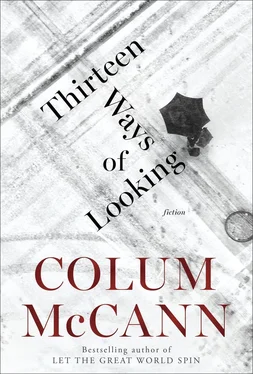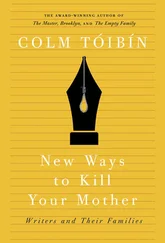11
It’s late September, and he is seriously deadlined now, but he is struck by the notion that the story is endless. He could stay with Kimberlee, or he could return to Afghanistan, or he could slide into the past, or he could follow Joel down to the bleachers with his sweetheart later tonight (let’s call her Tracey), or he could descend the hill to where the other Marines are having their party, or he could follow the path of a satellite, or he could go back to Sandi’s original lover, or he could summon in the snow to swirl across the night.
He is in Normandy by the sea. The waves ribbon and buckle on the shores of Étretat.
12
He cannot get this phrase out of his mind: The living and the dead.
13
How is it that a particle of a voice gets transmitted down a telephone line? How is it that Sandi summons up a simple phrase, and the muscles in her throat contract? How is it that Kimberlee hears a sound and already her hand is moving through space to reach for the white kitchen telephone? How is it that Joel feels a pang of desire for Tracey? (What exactly will those bleachers look like at midnight?) (And who, by the way, is Joel’s father?) (And what is it that Kimberlee teaches in university?) (Did she meet Sandi on a college campus?) (What might Sandi have been studying?) (When did Sandi move from Ohio?) (Did she join the Marines after a breakup?) (Was she married before she met Kimberlee?) (What is that initial tattooed on her hand?) (Does she want to have a child of her own?) How is it that a voice travels halfway around the world? Does it go through underwater cables, does it bounce off of satellites? How does a quark transmit itself to another quark? How many seconds of delay are there between Kimberlee’s voice and Sandi’s? Could a bullet travel that distance without them knowing? Could there now be a death at the end of this story? (Are there any female engagement teams in the Kerengal Valley?) (Is there even such a thing as a Browning M-57?) How private is the phone call? Who might be listening in? Can we create a brand-new character so late on, let’s say an agent in Kabul, a malevolent little slice of censorship, eavesdropping in on Sandi? Can we see him there, with his headphones, his heartlessness, his bitterness, his rancor?
And what about his own childhood New Year’s Eves in Dublin? Could he disappear back to them? What was that song his father used to sing? What about those days when he used to run out into the Clonkeen Road at midnight, banging saucepans to ring in the new year? What about that sense of promise the Januarys used to bring to his boyhood?
But more important — and perhaps most important — what happens to Sandi when she gets through on the telephone? What sort of feeling will rifle through her blood when she hears Kimberlee’s voice? What great desire might arc between them? Or what sort of silence might hollow itself down the telephone line? What will happen if they argue once again? Will Sandi describe the bunker where she sits? Will she try to articulate the darkness? Will those fine teeth chatter in the cold? Will Kimberlee open up immediately and make her young lover laugh? Will the white wine disappear from the glass? Will she talk about the bouillabaisse? Will she even use the word love ? What will Joel’s first words be to Sandi? Will he tell her about Tracey? Will he tell her that he will go down to the bleachers tonight? Will Joel’s father (let’s call him Paul, living up north, in a college town in New Hampshire, a biologist, an anti-war activist) ever hear any of this? How many years has he been estranged from Kimberlee? Has Sandi ever met him? How long will the phone call eventually last? What happens if the satellite suddenly fails?
Where will his own children be this New Year’s Eve?
How do we go back to the very simplicity of the original notion? How do we sit with Sandi in her lonely outpost? How do we look out into the dark?
(And who, anyway, was that dead Marine?)
13 redux
The phone rings: it rings and rings and rings.
It was their first Christmas in Galway together, mother and son. The cottage was hidden alongside the Atlantic, blue-windowed, slate-roofed, tucked near a grove of sycamore trees. The branches were bent inland by the wind. White spindrift blew up from the sea, landing softly on the tall hedges in the back garden.
During the day Rebecca could hear the rhythmic approach and fall of the waves against the shore. At night the sounds seemed to double.
Even in the wet chill of the December evenings, she slept with her window open, listening to the roll of the water sounding up from the low cliffs, rasping over the run of stone walls, sweeping toward the house, where it seemed to pause, hover a moment, then break.
On Christmas morning she left his present by the fireplace. Boxed and wrapped and tied with red ribbons. Tomas tore the package open, and it fell in a bundle at his feet. He had no idea what it was at first: he held it by the legs, then the waist, turned it upside down, clutched it dark against his chest.
She reached behind the tree and removed a second package: neoprene boots and a hood. Tomas stripped his shoes and shirt: he was thin, strong, pale. When he pulled off his trousers, she glanced away.
The wetsuit was liquid around him: she had bought it two sizes too big so he could grow into it. He spread his arms wide and whirled around the room: she hadn’t seen him so happy in months.
Rebecca gestured to him that they would go down to the water in a few hours.
—
THIRTEEN YEARS OLD AND THERE was already a whole history written in him. She had adopted him from Vladivostok at the age of six. On her visit to the orphanage, she had seen him crouched beneath a swing set. His hair was blond, his eyes a pellucid blue. Sores on his neck. Long, thin scars on his lower back. His gums soft and bloody. He had been born deaf, but when she called out his name he had turned quickly toward her: a sign, she was sure of it.
Shards of his story would always be a mystery to her: the early years, an ancestry she knew nothing about, a rumor that he’d been born near a rubbish dump. The possible inheritances: mercury, radiation sickness, beatings.
She was aware of what she was getting herself into, but she had been with Alan then. They stayed in a shabby hotel overlooking the Bay of Amur. Days of bribes and panic. Anxious phone calls late in the night. Long hours in the waiting room. A diagnosis of fetal alcohol syndrome gave them pause. Still, they left after six weeks, swinging Tomas between them. On the Aeroflot flight, the boy kept his head on her shoulder. At customs in Dublin, her fingers trembled over the paperwork. The stamp came down when Alan signed. She grabbed Tomas’s hand and ran him, laughing, through Arrivals: it was her forty-first birthday.
The days were good then: a three-bedroom house in Stepaside, a series of counselors, therapists, speech experts, and even her parents to help them out.
Now, seven years on, she was divorced, living out west, her parents were gone, and her task had doubled. Her savings were stretched. The bills slipped one after the other through the letter box. There were rumors that the special school in Galway might close. Still, she wasn’t given to bitterness or loud complaint. She made a living translating from Hebrew to English — wedding vows, business contracts, cultural pamphlets. There was a literary novel or two from a left-wing publisher in Tel Aviv: the pay was derisory, but she liked stepping into that otherness, and the books were a stay against indifference.
Forty-eight years old and there was still a beauty about her, an olive to her skin, a sloe to her eyes, an aquiline sweep to her nose. Her hair was dark, her body thin and supple. In the small village she fit in well, even if she stood at a sharp angle to the striking blondness of her son. She relished the Gaeltacht, the shifting weather, the hard light, the wind off the Atlantic. Bundled up against the chill, they walked along the pier, amongst the lobster pots and coiled ropes and disintegrating fishing boats. The rain slapped the windows of the shuttered shops. No tourists in winter. In the supermarket the local women often watched them: more than once Rebecca was asked if she was the bean cabhrach, a phrase she liked — the help, the nanny, the midwife.
Читать дальше












